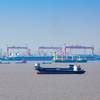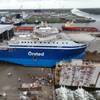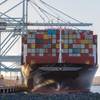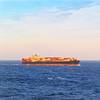Washington State Ferries, a company that operates on routes with tremendous environmental concern and legislation, recently refit one of its ferries, Nisqually, with a bio-enhanced Oil Water Separator solution from ECP Service Corp.
The Washington State Department of Transportation operates one of the largest passenger and automobile ferry services in the world, with 29 vessels capable of generating between 2,000 to 3,000 gallons of oil water in the vessels' bilge each month. The company sought a solution that would reduce or eliminate disposal cost, improve oily water separator efficiency and create a more environmentally responsible operation.
Vessels without oily water separators - as Nisqually was - depend on bilge water disposal since they have no means to meet local water quality regulations needed to permit discharge into a sewer. WSF chose Nisqually as the test vessel to validate bioremediation efficiency and to develop treatment protocols that would apply throughout the fleet. The bench test included a 355-gal. fuel tank that was modified to provide aeration. ECP's Remediator was added directly into the bilge for bioremediation pre-treatment, and to help maintain a clean bilge. Bilge water was pumped to the remediation tank and aerated to maintain an aerobic environment, and to ensure thorough mixing of Remediator - which contains live, naturally occurring bacteria and nutrients - with oily bilge water. The test was a success, and the system was permanently installed first aboard M/V Kaleetan.
ECP Service Corporation is an environmental manufacturing and service company that specializes in industrial and marine waste management applications. ECP's Earth Care Products include bioremediation, environmentally safe non-emulsifying degreasers, and emergency response products. In response to the marine industry's growing concerns over accidental discharge of oily water, maintenance costs associated with bilge water treatment, and increasing costs for waste oil and sludge disposal, ECP has innovated a retrofit enhancement for shipboard oily water treatment applications, that greatly simplifies environmental compliance.
Marine Oil Water Separator Operation
OWS units serve a vital function in that they aid in the separation of oil particles from water. For marine applications, space is limited. Therefore, OWS units must be relatively small as compared to their land-based counterparts. To achieve adequate treatment, most marine OWS units incorporate some form of coalescing media (corrugated plates are a common example).
Typically, the separated oil is recovered and transferred to a waste oil tank for later disposal, and the effluent water is discharged to sea (if
Sponsored Content
Chris-Marine’s solutions help to prolong engine lifetime

Subscribe for
Maritime Reporter E-News
Maritime Reporter E-News is the maritime industry's largest circulation and most authoritative ENews Service, delivered to your Email five times per week










